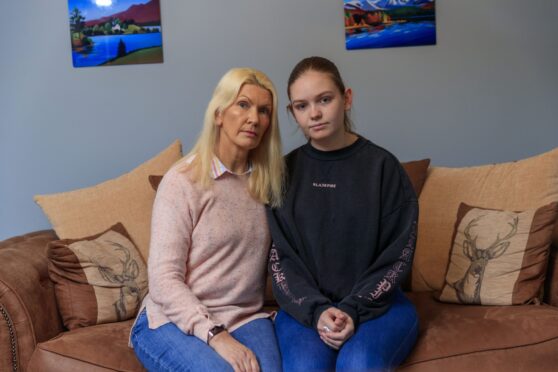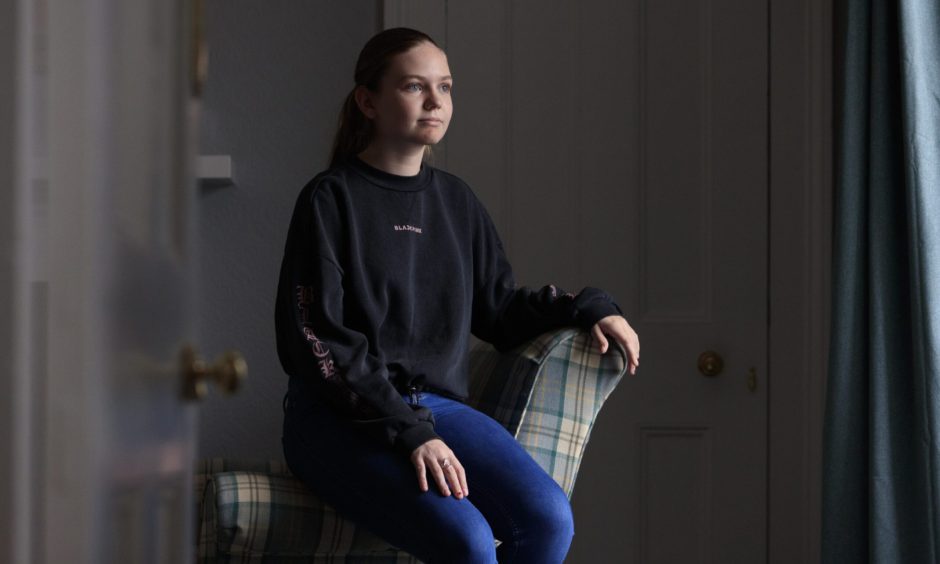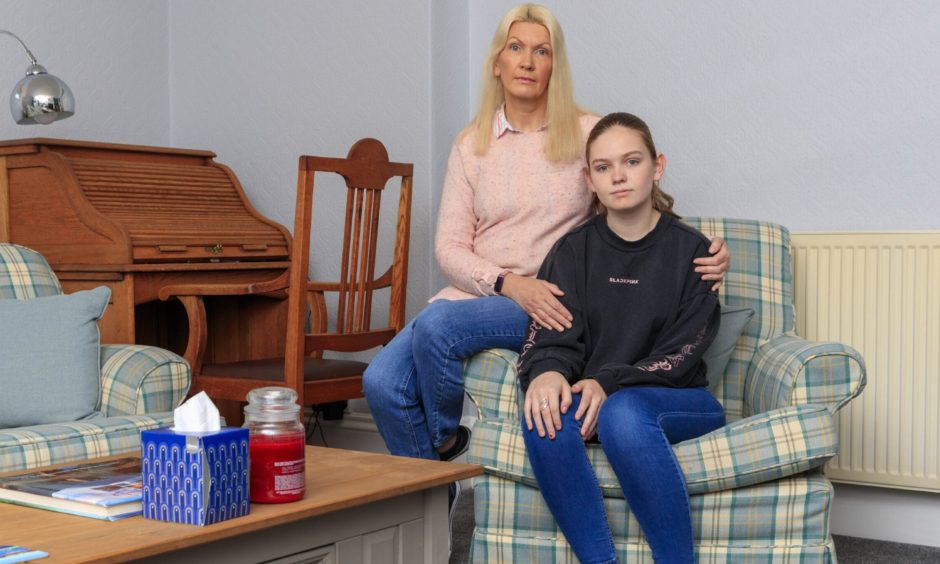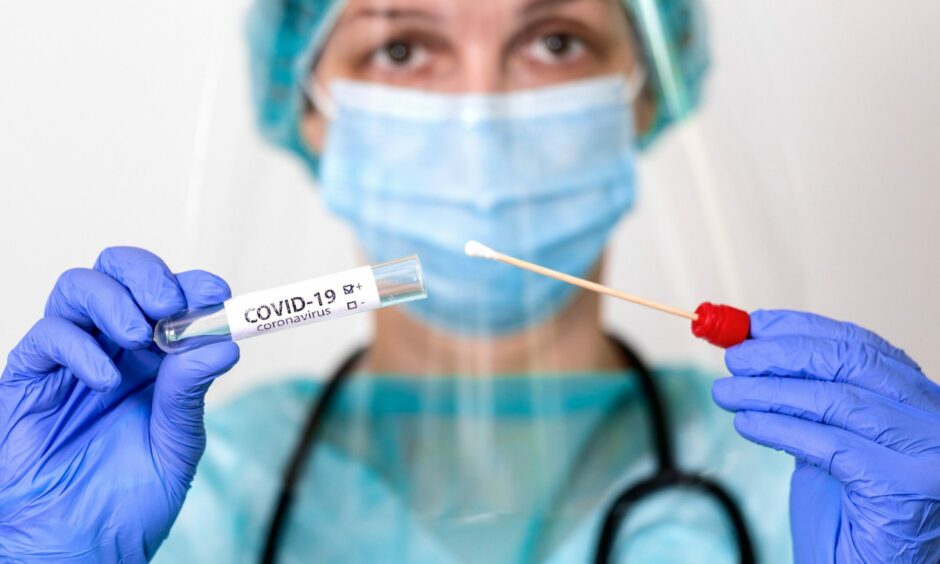A north-east mum flew her daughter to Saudi Arabia to access private healthcare in a desperate bid to get NHS doctors to treat her 18-year-old daughter’s debilitating Long Covid symptoms.
Amanda Jelley, who lives near Huntly, appeared before the Scottish Covid Inquiry in Edinburgh on Wednesday where she detailed her four-year fight for daughter, Elizabeth.
After failing to get answers from the NHS, Ms Jelley took things into her own hands, and “in desperation” looked to get a diagnosis through private healthcare.
She told the inquiry:
- Her family sought private treatment from international experts, including a doctor at John Hopkins University in Baltimore.
- Elizabeth now has to use a wheelchair due to her symptoms and has been unable to go to school for around four years.
- Ms Jelley has “hardly seen” her husband in four years while he works to afford private healthcare.
Elizabeth had been a competitive skier, “really academic” and had the “world in front of her”, the inquiry was told.
But it soon became apparent something wasn’t right around 10 days after contracting the illness in April 2020, when her mum went into her room to find her “slumped asleep” at her desk.
Elizabeth was unable to attend school, play sports, could barely walk around the house, and would sleep up to 20 hours a day, Ms Jelley told the inquiry.
While blood results came back normal, her symptoms included extreme fatigue, migraines, breathlessness and muscle and back pains.
‘Back to square one’
After making a slight improvement, the teenager caught Covid for a second time in January 2021 and found herself “back to square one”.
By March that year, her parents asked for Elizabeth to be referred to a paediatrician.
Ms Jelley said: “We saw the paediatrician really quickly, I think within a couple of weeks which was incredible.
“However, when we did see him, and I explained how I thought it was Long Covid.
“He said he didn’t know anything about Long Covid so actually although we got to see a doctor, it didn’t help us.”
Blood tests came back normal and her mum said doctors didn’t believe the extent of her daughter’s medical problems.
Ms Jelley said: “Things we needed from the paediatrician I was having to ask for myself. Things like migraine tablets, can you prescribe? I shouldn’t have had to be her doctor.”
She added: “The help we got was things we asked for. There was no initiation from the paediatrician to suggest things or to say I’ve read some research which suggests this might help.”
The family felt they had no option but to seek help from the private sector but felt their recommendations were “shut down and dismissed” by their GP.
A referral was eventually made to the chronic fatigue clinic based in Glasgow but while the clinic accepted the referral, it was later refused.
‘Open the floodgates’
Ms Jelley said she was contacted by the paediatrician who told her the decision was “purely based on the fact it would open the floodgates to other Long Covid sufferers”.
After being denied mental health assessment on the NHS, Liz received private counselling, after becoming “more and more depressed” from her chronic illness.
In October 2021, the family took Liz abroad for medical diagnosis and treatment for the first time because of “long waiting times in the UK”.
Ms Jelley told the inquiry: “She had been losing her hair as well as part of the Long Covid.
“But then we realised she had these really horrible wounds in her head as well and the waiting times were so long that we took her overseas.
“My husband works overseas so had insurance. We’re one of the lucky ones and so we accessed private healthcare in Saudi Arabia and had that treated.”
In March 2022, the family got access to a professor at Johns Hopkins University in Baltimore who was a specialist in post-viral conditions and chronic fatigue in children.
He referred Elizabeth to one of his colleagues who was a cardiologist in Saudi Arabia who diagnosed her with Postural tachycardia syndrome (PoTS).
This is when your heart rate increases very quickly after getting up from sitting or lying down. But on returning to the UK, doctors would not acknowledge the diagnosis.
The inquiry also heard that the medication prescribed in Saudi Arabia led to eye pain and “almost led to the loss” of Elizabeth’s sight.
It was deemed that stopping the medication would stop the problem and prevent sight loss.
Ms Jelley said: “It was a mainstream medication and the GP has used that as his tool for berating me about care outside of the NHS.”
The mum said she had “no choice” but to seek private options and added it has “never been about queue jumping”.
Asked about the impact on her daughter, Ms Jelley said Elizabeth is “desperate to have a normal life”.
She added: “She spends most of her time with her mum. She’s just 18 now. What child of any age wants to spend 24-7 with her mum and no one else – it’s heartbreaking.”




Conversation